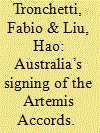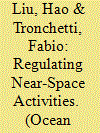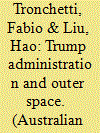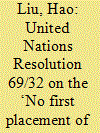|
|
|
Sort Order |
|
|
|
Items / Page
|
|
|
|
|
|
|
| Srl | Item |
| 1 |
ID:
178851


|
|
|
|
|
| Summary/Abstract |
On 15 October 2020, Australia signed the US Artemis Accords. Such a move was heralded as an important step towards promoting the Australian space program and enabling the country to take part in an ambitious space exploration venture. While not denying the importance of such a move, the present commentary analyzes it in a critical manner by assessing its legal and diplomatic implications. Taking into account Australia’s prior membership of the 1979 Moon Agreement and the discrepancies that exists between the Agreement’s provisions and those of the Artemis Accords, the present commentary not only views Australia’s simultaneous membership of both instruments as problematic but also considers it not sustainable in the long term. Based on these considerations, this commentary recommends Australia to either reconsider its membership to the Moon Agreement or, at least, to clarify how the two instruments may co-exists from a legal and political perspective.
|
|
|
|
|
|
|
|
|
|
|
|
|
|
|
|
| 2 |
ID:
167515


|
|
|
|
|
| Summary/Abstract |
The deployment of high-altitude vehicles in near space with the purpose of providing Internet, communication, and other services represents the new frontier of aerospace activities. Near-space operations are attracting growing interest due to their mult-purpose nature and their anticipated high profitability. Despite such positive perceptions, near-space plans are, however, hampered by the uncertain international legal status of near space. Using the precedent of the exclusive economic zone (EEZ), this article suggests a new categorization of the near space as the exclusive utilization space (EUS) and a set of rules to manage its utilization.
|
|
|
|
|
|
|
|
|
|
|
|
|
|
|
|
| 3 |
ID:
160946


|
|
|
|
|
| Summary/Abstract |
In a relatively short period of time, the Trump administration has been fairly active in the field of space. The reconstitution of the National Space Council, under the direction of Vice President Pence, the President’s signing of Space Policy Directive 1, that calls for the return of humans to the Moon, and the announcement of a National Space Strategy that calls for an ‘America first’ approach in space, have been the highlights of this process. A key component of the administration’s approach has been the promotion of commercial (private) space activities through an effort of regulatory reform intended to facilitate free enterprise and individual initiative in space.
Overall, it is evident that the Trump administration views a consolidated US leadership in space as instrumental to ‘Make America Great Again’. However, due to the lack of cohesion in the management of the US space program, the controversial interpretation of international principles and the US-centred view of space endorsed by the administration, doubts remain as to whether the space policy of the Trump administration will foster US leadership in space or lead to its progressive isolation.
|
|
|
|
|
|
|
|
|
|
|
|
|
|
|
|
| 4 |
ID:
157168


|
|
|
|
|
| Summary/Abstract |
On 2 December 2014, the United Nations General Assembly (UNGA) adopted with a vote of 126 in favor, 4 against and 46 abstentions, Resolution 69/32 entitled ‘No first placement of weapons in space. Despite the limited attention received in academic circles, the adoption of Resolution 69/32 represents an important development in the area of space security. First, it indicates the growing recognition of the positive role that transparency and confidence-building measures (TCBMs) play in preventing an arms race in space (PAROS), even from the perspective of those States that has suggested the adoption of a treaty on PAROS, namely China and Russia. Second, it shows the willingness of a crescent number of members of the United Nations General Assembly to engage in initiatives aimed at promoting a more secure space environment. Third, its controversial reception proves that a universal solution to the issue of space security still lays far ahead.
|
|
|
|
|
|
|
|
|
|
|
|
|
|
|
|
|
|
|
|
|